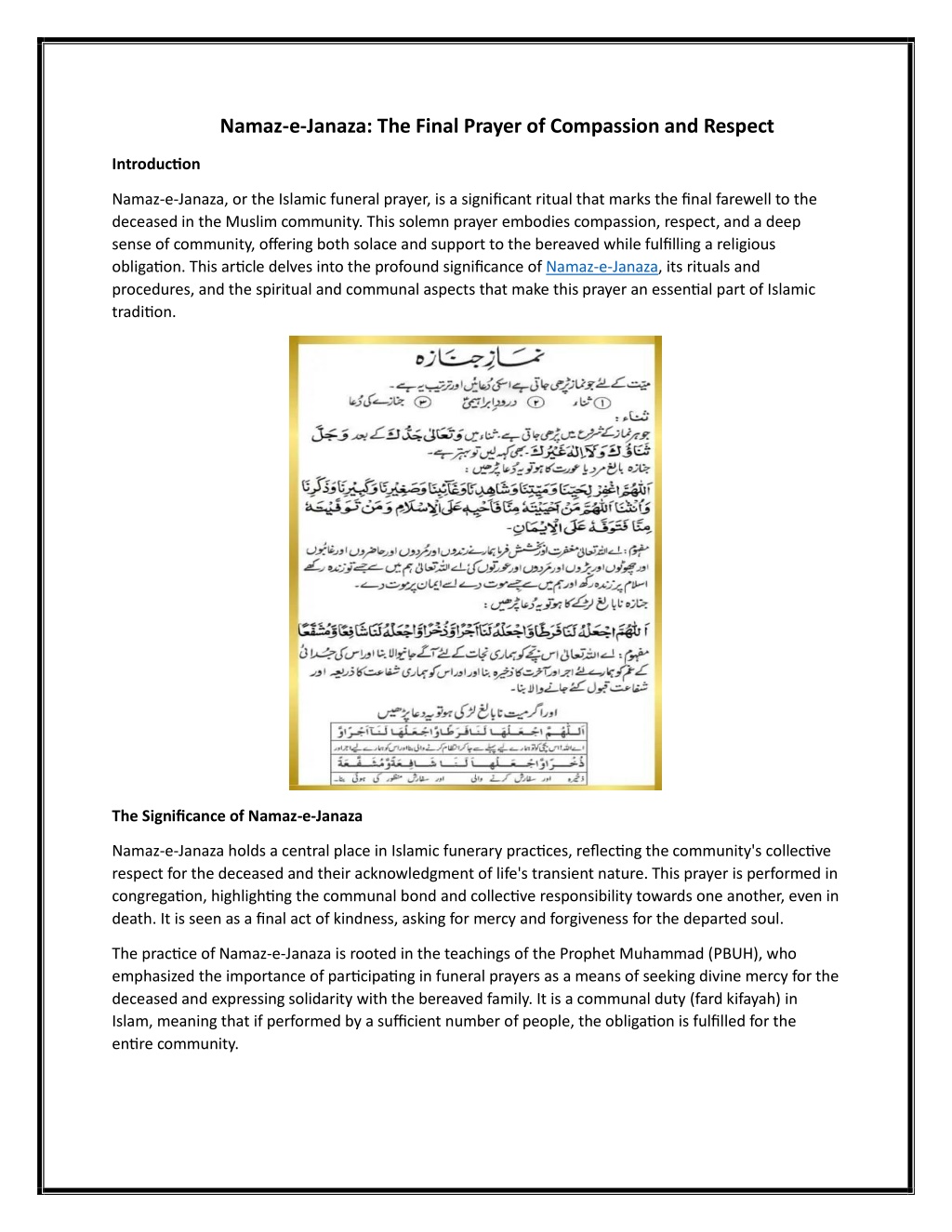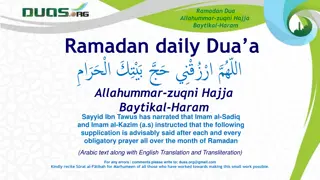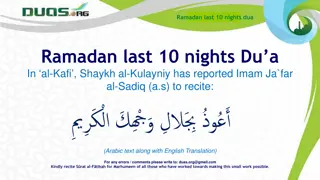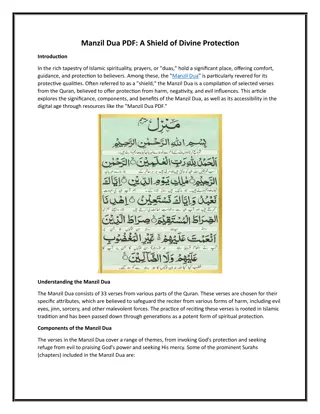
Namaz e Janaza ki Dua
Namaz-e-Janaza is a deeply respectful and compassionate practice within Islam, offering a final prayer for the deceased and a moment of reflection for the living. It highlights the importance of community, equality, and the collective responsibility
- NamazEJanaza
- FuneralPrayer
- IslamicRituals
- IslamicPrayer
- MuslimFuneral
- RespectForDeceased
- IslamicTradition
- FinalFarewell
- IslamicFaith
- IslamicTeachings
- CompassionAndRespect
- PrayerForDeceased
- IslamicCustoms
- MuslimCommunity
- SpiritualJourney
Download Presentation

Please find below an Image/Link to download the presentation.
The content on the website is provided AS IS for your information and personal use only. It may not be sold, licensed, or shared on other websites without obtaining consent from the author. Download presentation by click this link. If you encounter any issues during the download, it is possible that the publisher has removed the file from their server.
E N D
Presentation Transcript
Namaz-e-Janaza: The Final Prayer of Compassion and Respect Introduction Namaz-e-Janaza, or the Islamic funeral prayer, is a significant ritual that marks the final farewell to the deceased in the Muslim community. This solemn prayer embodies compassion, respect, and a deep sense of community, offering both solace and support to the bereaved while fulfilling a religious obligation. This article delves into the profound significance of Namaz-e-Janaza, its rituals and procedures, and the spiritual and communal aspects that make this prayer an essential part of Islamic tradition. The Significance of Namaz-e-Janaza Namaz-e-Janaza holds a central place in Islamic funerary practices, reflecting the community's collective respect for the deceased and their acknowledgment of life's transient nature. This prayer is performed in congregation, highlighting the communal bond and collective responsibility towards one another, even in death. It is seen as a final act of kindness, asking for mercy and forgiveness for the departed soul. The practice of Namaz-e-Janaza is rooted in the teachings of the Prophet Muhammad (PBUH), who emphasized the importance of participating in funeral prayers as a means of seeking divine mercy for the deceased and expressing solidarity with the bereaved family. It is a communal duty (fard kifayah) in Islam, meaning that if performed by a sufficient number of people, the obligation is fulfilled for the entire community.
Rituals and Procedures of Namaz-e-Janaza Namaz-e-Janaza is a straightforward but highly spiritual act of worship that consists of four main parts, known as takbirs (declarations of Allah's greatness). The prayer does not include bowing (ruku) or prostration (sujood) like the regular daily prayers but instead focuses on supplication and intercession. 1.The First Takbir: The prayer begins with the first takbir, where the congregation raises their hands and declares "Allahu Akbar" (Allah is the Greatest). This is followed by the recitation of Surah Al-Fatihah (The Opening), which praises Allah and seeks His guidance and mercy. 2.The Second Takbir: After the second takbir, the congregation prays for blessings upon the Prophet Muhammad (PBUH) and his family, often reciting the Salat al-Ibrahimiyya, a prayer that is also recited during regular Salah. 3.The Third Takbir: The third takbir is a supplication for the deceased, asking Allah to forgive their sins, grant them mercy, and admit them into Paradise. It is common to also pray for all deceased Muslims, reflecting the inclusive and compassionate nature of the prayer. 4.The Fourth Takbir: The final takbir marks the end of the prayer, and it is typically followed by a short supplication for the living, asking for patience and strength for the bereaved family. The prayer concludes with the salaam, a greeting of peace to the right and left, similar to the conclusion of other Islamic prayers. Spiritual and Communal Aspects Namaz-e-Janaza is more than a ritual; it is a profound expression of faith and a reminder of the temporality of life. For those who participate, it serves as a moment of reflection on their mortality and
the importance of living a righteous life. The prayer emphasizes the values of humility, compassion, and the acknowledgment of Allah's ultimate control over life and death. The communal nature of Namaz-e-Janaza is equally important. By coming together to pray for the deceased, the community offers support to the grieving family, reinforcing social bonds and mutual responsibilities. This collective act of worship underscores the Islamic principle of brotherhood and the shared journey of life and afterlife. Moreover, the prayer serves as a social equalizer, as all Muslims, regardless of their social status, are given the same prayer and respect in death. This reflects the core Islamic belief in equality and the transient nature of worldly possessions and status. Preparation and Conduct The preparation for Namaz-e-Janaza involves several important steps that honor the deceased and ensure the proper conduct of the prayer. These include: 1.Ghusl (Ritual Washing): The body of the deceased is washed in a ritual called ghusl, which symbolizes purification and respect for the deceased. This act is performed by close family members or trusted members of the community. 2.Kafan (Shrouding): After washing, the body is wrapped in a plain white cloth called kafan. This simple shroud signifies the equality of all in death and the humility before Allah. 3.Placement and Prayer: The body is then placed in front of the congregation, with the Imam standing closest to the head of the deceased (or the middle if the deceased is a woman) during the prayer. The congregation stands behind the Imam in rows, facing the Qibla (the direction of the Kaaba in Mecca). 4.Post-Prayer Rituals: Following the Namaz-e-Janaza, the body is taken for burial, which should ideally be done as soon as possible. Burial practices vary slightly depending on cultural and regional customs but generally involve placing the body in a grave, facing the Qibla. Conclusion Namaz-e-Janaza is a deeply respectful and compassionate practice within Islam, offering a final prayer for the deceased and a moment of reflection for the living. It highlights the importance of community, equality, and the collective responsibility to care for one another. As a sacred ritual, it serves as a powerful reminder of life's fleeting nature and the enduring bonds that connect us beyond this world. Through Namaz-e-Janaza, Muslims express their faith in Allah's mercy, their respect for the deceased, and their support for the bereaved, embodying the core values of compassion and respect that lie at the heart of Islamic teachings.









